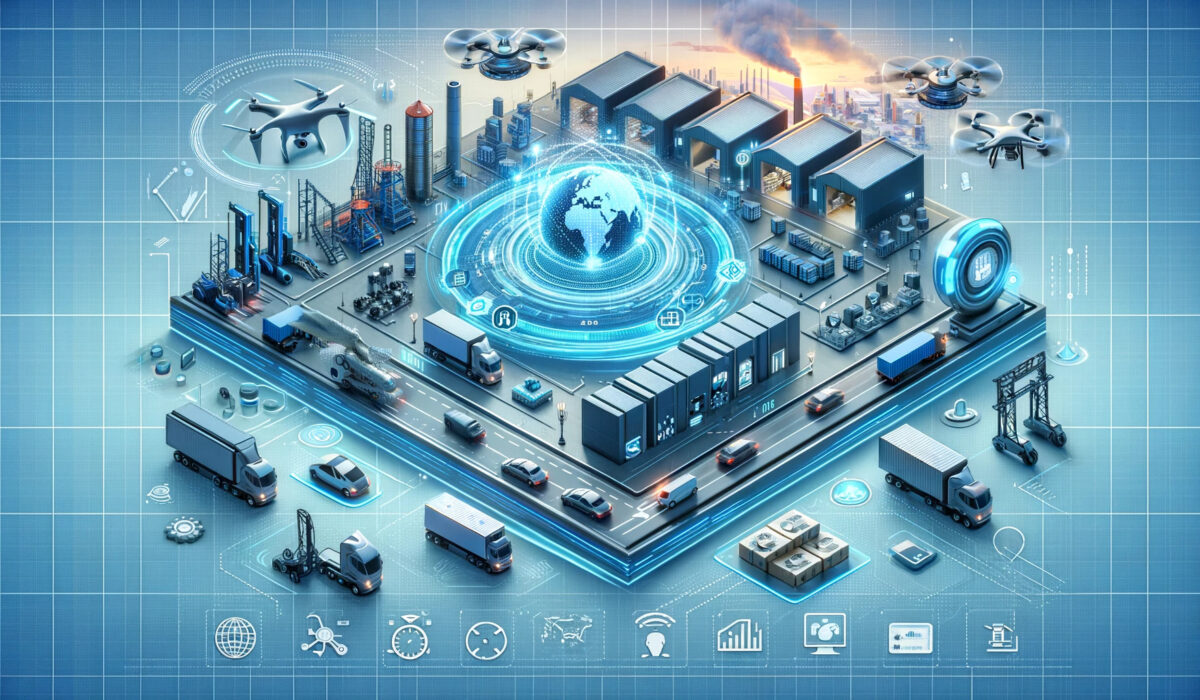LOGISTICS INDUSTRY AND ARTIFICIAL INTELLIGENCE

Artificial intelligence
Artificial intelligence; Unlike natural intelligence, it is a type of intelligence driven by machines. According to Popov, artificial intelligence; It is defined as “making computers do the work that people have done”. Computer or computer-controlled machine in artificial intelligence; It performs many activities similar to living beings with natural intelligence, such as exhibiting human-like behaviors, reasoning, perceiving sounds, acting, making sense, finding a solution, learning from past experiences.
Studies on the fields where artificial intelligence is used are on intelligent behavior. The goal here is to create a theory that aims to artificially reproduce the intelligent behavior of beings in nature. Artificial intelligence is the most common in daily life; It is used in fields such as image, sound, text, data processing, analysis of health data and treatment planning, driving systems, insurance and finance, big data analytics, smart applications in agriculture and animal, and cyber security.
Since artificial intelligence is a comprehensive field that includes complex processes, its field of study includes many subfields and methods. Sub-fields of artificial intelligence; cognitive computing, computer vision, machine learning, artificial neural networks, deep learning, natural language processing.
Machine Learning
Machine learning, which is one of the sub-fields of artificial intelligence, is simply; It is defined as a kind of application in which computer programs can learn patterns through data or algorithms. In the machine learning process, systems determine patterns, make predictions, create tasks automatically, and make decisions with minimal human intervention thanks to data. In order to be able to learn from data effectively in this process, the data must be of sufficient size and quality.
Machine learning techniques often try to imitate nature based on the experience that humans have accumulated since their existence. It is driven by human brain functioning, the theory of human knowledge acquisition and reasoning, and the sociological theories behind human behavior.
Machine learning strategies are divided into three headings. These; supervised, unsupervised and reinforcement learning. In supervised learning; The target values are given against the input values and it is aimed to obtain the closest output to the target values according to the relationship between them. In unsupervised learning; target values are not labeled, clustering is done according to similarities. Reinforcement learning, the most appropriate solution is not known by the system, so the solutions are determined by repeating. In this process, rational approaches are rewarded and wrong steps are punished.
Logistics
While companies pay attention to the requirements of delivery time, reliability and quality, they should also fulfill the requirements of new incentives and market needs. Therefore, it is necessary to have a functioning, sustainable logistics and to integrate easily with innovations. Innovative solutions in the logistics sector; It can be defined as a regular research based on continuous improvement, up-to-date control and delivery of work, quality of activities, finding more innovative and better ways to implement logistics activities.
Together with the concept of “Industry 4.0”, which affects all sectors with the development of technology, the logistics industry has also tried to change, and the concept of “Logistics 4.0” has emerged in this way. Logistics 4.0 includes the latest logistics technology, including applications such as networking, digitization, Cloud computing systems. According to this definition, the logistics process no longer only covers the transportation process. In addition to this process, it also includes the entire supply chain and the coordination between companies.
Logistics 4.0 can be defined as supply chain and logistics common cyber-physical systems within Industry 4.0. Cyber-physical systems cause logistics to be called intelligent logistics. Smart logistics; It maximizes efficiency by affecting certain supply chain processes such as distribution and storage. The concept of Logistics 4.0 includes smart products and smart services, increasing the level of logistics flexibility. Therefore, it is possible to meet the demands caused by high fluctuations in the market.
Logistics and Artificial Intelligence
The logistics sector is a sector open to development. In the logistics industry, where there is tough competition all over the world, institutions have to look for new ways and keep up with technology in order to provide the most effective customer experience, not to behind the digital world, to make their operations fast and efficient. One of the technologies suitable for integration with the logistics sector is artificial intelligence applications. Artificial intelligence applications in the logistics chain; It is used in many stages such as demand forecasting, order picking, product tracking, storage, inventory management and operation planning and gives very positive results.
In the logistics sector, artificial intelligence is used in all different areas, from automatic rack systems in the warehouse to route optimization. Thanks to RFID readers in machine learning, information about the effects of the products and their packages are transferred to the database, fuel consumption is reduced with autonomous vehicles, and natural energy is used with smart ways.
It is possible to give the Netherlands as an example of one of the application areas where machine learning is used. The Port of Rotterdam, located in Rotterdam, Netherlands, has private vehicles and automated terminals. Thanks to automated guided vehicles, all kinds of unmanned transportation activities are carried out. In addition, containers are stacked with automatic stacking vehicles, so that smart containers collect data such as current, temperature, wind, weather during the journey. These collected data are also analyzed by IoT technologies, helping to determine the most appropriate time for the ship.
Apart from the developed equipment given in the Netherlands example, the other application area of artificial intelligence is robots. During the logistics process, the tracking of the products in the warehouses, the accuracy and coordination of the order can be managed by robots. It has been proven that with the robots taking part in the warehouses, up to 4 times the speed and efficiency of the warehouse activities compared to the human power. One of the best examples of robots starting to work in warehouses is Amazon warehouses. It is stated that over 15,000 Kiva robots work at Amazon. Thanks to these autonomous robots, the codes on the products requested by the customers are read by the cameras in the robots in order processing centers and the products are delivered by the robots to the employees who prepare the shipment in line with the instructions they receive.
Other advantages of Artificial Intelligence to the logistics industry;
– Reducing costs by cost control
– Order picking efficiency with robot technology
– Fast and safe delivery with autonomous vehicles and drones
– Stock and time management
– Taking precautions for traffic that will occur during delivery
– A transparent supply chain process
– Quality control
– Continuous integration during operation
– Impact on the future performance of the company.
Problems such as the rapid growth of the sector in the logistics sector, increasing customer demands, and adaptation to more business lines cause insufficient human power. Therefore, artificial intelligence provides the highest performance with minimum time and minimum error in logistics processes. With the age of Industry 4.0 we are in, it is important to be prepared for the Industry 5.0 age as well as to achieve this performance. Companies need to survive in order to adapt to the next era and to reach that era. In a competitive environment such as the logistics sector, your technology, knowledge and competencies used in the past are not enough to keep companies alive. Companies have to incorporate technology that constantly renews itself. The world’s largest companies are also working to produce and develop technology themselves, in addition to receiving external support to manage their logistics processes. For this reason, integrating artificial intelligence into the logistics sector will accelerate the process of adaptation to technology and the new age.

